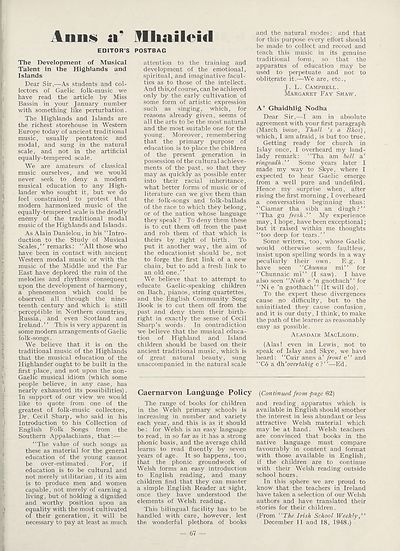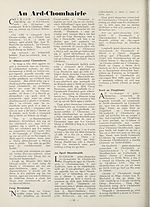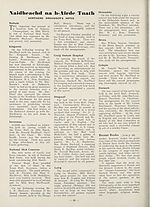An Comunn Gàidhealach Publications > Gaidheal > Volumes 44--45, January 1949--December 1950
(113) Page 67
Download files
Complete book:
Individual page:
Thumbnail gallery: Grid view | List view

Anns a'
EDITOR’S
The Development of Musical
Talent in the Highlands and
Islands
Dear Sir,—As students and col¬
lectors of Gaelic folk-music we
have read the article by Miss
Bassin in your January number
with something like perturbation.
The Highlands and Islands are
the richest storehouse in Western
Europe today of ancient traditional
music, usually pentatonic and
modal, and sung in the natural
scale, and not in the artificial
equally-tempered scale.
We are amateurs of classical
music ourselves, and we would
never seek to deny a modern
musical education to any High¬
lander who sought it, but we do
feel constrained to protest that
modern harmonized music of the
equally-tempered scale is the deadly
enemy of the traditional modal
music of the Highland's and Islands.
As Alain Danielou, in his “Intro¬
duction to the Study of Musical
Scales,’’ remarks: “All those who
have been in contact with ancient
Western modal music or with the
music of the Middle and the Far
East have deplored the ruin of the
melodies and rhythms consequent
upon the development of harmony,
a phenomenon which could be
observed all through the nine¬
teenth century and which is still
perceptible in Northern countries,
Russia, and even Scotland and
Ireland. ’ ’ This is very apparent in
some modern arrangements of Gaelic
folk-songs.
We believe that it is on the
traditional music of the Highlands
that the musical education of the
Highlander ought to be built in the
first place, and not upon the non-
Gaelic musical idiom (which some
people believe, in any case, has
nearly exhausted its possibilities).
In support of our view we would
like to quote from one of the
greatest of folk-music collectors.
Dr. Cecil Sharp, who said in his
Introduction to his Collection of
English Folk Songs from the
Southern Appalachians, that:—
“The value of such songs as
these as material for the general
education of the young cannot
be over-estimated. For, if
education is to be cultural and
not merely utilitarian, if its aim
is to produce men and women
capable, not merely of earning a
living, but of holding a dignified
and worthy position upon an
equality with the most cultivated
of their generation, it will be
necessary to pay at least as much
Mluiilcitl
POSTBAG
attention to the training and
development of the emotional,
spiritual, and imaginative facul¬
ties as to those of the intellect.
And this,of course, can be achieved
only by the early cultivation of
some form of artistic expression
such as singing, which, for
reasons already given, seems of
all the arts to be the most natural
and the most suitable one for the
young. Moreover, remembering
that the primary purpose of
education is to place the children
of the present generation in
possession of the cultural achieve¬
ments of the past, so that they
may as quickly as possible enter
into their racial inheritance,
what better forms of music or of
literature can we give them than
the folk-songs and folk-ballads
of the race to which they belong,
or of the nation whose language
they speak ? To deny them these
is to cut them off from the past
and rob them of that which is
theirs by right of birth. To
put it another way, the aim of
the educationist should be, not
to forge the first link of a new
chain, but to add a fresh link to
an old one. ’ ’
We believe that to attempt to
educate Gaelic-speaking children
on Bach, pianos, string quartettes,
and the English Community Song
Book is to cut them off from the
past and deny them their birth¬
right in exactly the sense of Cecil
Sharp’s words. In contradiction
we believe that the musical educa¬
tion of Highland and Island
children should be based on their
ancient traditional music, which is
of great natural beauty, sung
unaccompanied in the natural scale
Caernarvon Language Policy
The range of books for children
in the Welsh primary schools is
increasing in number and variety
each year, and this is as it should
be: for Welsh is an easy language
to read, in so far as it has a strong
phonic basis, and the average child
learns to read fluently by seven
years of age. It so happens, too,
that the phonic groundwork of
Welsh forms an easy introduction
to English reading, and many
children find that they can master
a simple English Reader at sight,
once they have understood the
elements of Welsh reading.
This bilingual facility has to be
handled with care, however, lest
the wonderful plethora of books
— 67 —
and the natural modes; and that
for this purpose every effort should
be made to collect and record and
teach this music in its genuine
traditional form, so that the
apparatus of education may be
used to perpetuate and not to
obliterate it.—We are, etc.,
J. L. Campbell.
Margaret Fay Shaw.
A’ Ghaidhlig Nodha
Dear Sir,—I am in absolute
agreement with your first paragraph
(March issue, Thall 's a Bhos),
which, I am afraid, is but too true.
Getting ready for church in
Islay once, I overheard my land¬
lady remark: “Tha am bell a’
ringeadh. ’ ’ Some years later I
made my way to Skye, where I
expected to hear Gaelic emerge
from a well pure and undefiled.
Hence my surprise when, after
rising the first morning, I overheard
a conversation beginning thus:
"Ciamar tha sibh an diugh?”
“Tha gu fresh..” My experience
may, I hope, have been exceptional;
but it raised within me thoughts
“too deep for tears.’’
Some writers, too, whose Gaelic
would otherwise seem faultless,
insist upon spelling words in a way
peculiarly their own. E.g. I
have seen "Chunna mi’’ for
“Chunnaic mi’’ (I saw). I have
also seen ‘‘Nidh e ’n gnothach’’ for
“Ni e ’n gnothach’ ’ (It will do).
To the expert these divergences
cause no difficulty, but to the
uninitiated they cause confusion,
and it is our duty, I think, to make
the path of the learner as reasonably
easy as possible.
Alasdair MacLeoid.
(Alas! even in Lewis, not to
speak of Islay and Skye, we have
heard: “Cuir anns a’ front e” and
“C6 a dh’overtakig e ? ’ ’—Ed.
(Continued from page 62)
and reading apparatus which is
available in English should smother
the interest in less abundant or less
attractive Welsh material which
may be at hand. Welsh teachers
are convinced that books in the
native language must compare
favourably in content and format
with those available in English,
if the children are to continue
with their Welsh reading outside
school hours.
In this sphere we are proud to
know that the teachers in Ireland
have taken a selection of our Welsh
authors and have translated their
stories for their children.
(From ‘‘The Irish School Weekly,”
December 11 and 18, 1948.)
EDITOR’S
The Development of Musical
Talent in the Highlands and
Islands
Dear Sir,—As students and col¬
lectors of Gaelic folk-music we
have read the article by Miss
Bassin in your January number
with something like perturbation.
The Highlands and Islands are
the richest storehouse in Western
Europe today of ancient traditional
music, usually pentatonic and
modal, and sung in the natural
scale, and not in the artificial
equally-tempered scale.
We are amateurs of classical
music ourselves, and we would
never seek to deny a modern
musical education to any High¬
lander who sought it, but we do
feel constrained to protest that
modern harmonized music of the
equally-tempered scale is the deadly
enemy of the traditional modal
music of the Highland's and Islands.
As Alain Danielou, in his “Intro¬
duction to the Study of Musical
Scales,’’ remarks: “All those who
have been in contact with ancient
Western modal music or with the
music of the Middle and the Far
East have deplored the ruin of the
melodies and rhythms consequent
upon the development of harmony,
a phenomenon which could be
observed all through the nine¬
teenth century and which is still
perceptible in Northern countries,
Russia, and even Scotland and
Ireland. ’ ’ This is very apparent in
some modern arrangements of Gaelic
folk-songs.
We believe that it is on the
traditional music of the Highlands
that the musical education of the
Highlander ought to be built in the
first place, and not upon the non-
Gaelic musical idiom (which some
people believe, in any case, has
nearly exhausted its possibilities).
In support of our view we would
like to quote from one of the
greatest of folk-music collectors.
Dr. Cecil Sharp, who said in his
Introduction to his Collection of
English Folk Songs from the
Southern Appalachians, that:—
“The value of such songs as
these as material for the general
education of the young cannot
be over-estimated. For, if
education is to be cultural and
not merely utilitarian, if its aim
is to produce men and women
capable, not merely of earning a
living, but of holding a dignified
and worthy position upon an
equality with the most cultivated
of their generation, it will be
necessary to pay at least as much
Mluiilcitl
POSTBAG
attention to the training and
development of the emotional,
spiritual, and imaginative facul¬
ties as to those of the intellect.
And this,of course, can be achieved
only by the early cultivation of
some form of artistic expression
such as singing, which, for
reasons already given, seems of
all the arts to be the most natural
and the most suitable one for the
young. Moreover, remembering
that the primary purpose of
education is to place the children
of the present generation in
possession of the cultural achieve¬
ments of the past, so that they
may as quickly as possible enter
into their racial inheritance,
what better forms of music or of
literature can we give them than
the folk-songs and folk-ballads
of the race to which they belong,
or of the nation whose language
they speak ? To deny them these
is to cut them off from the past
and rob them of that which is
theirs by right of birth. To
put it another way, the aim of
the educationist should be, not
to forge the first link of a new
chain, but to add a fresh link to
an old one. ’ ’
We believe that to attempt to
educate Gaelic-speaking children
on Bach, pianos, string quartettes,
and the English Community Song
Book is to cut them off from the
past and deny them their birth¬
right in exactly the sense of Cecil
Sharp’s words. In contradiction
we believe that the musical educa¬
tion of Highland and Island
children should be based on their
ancient traditional music, which is
of great natural beauty, sung
unaccompanied in the natural scale
Caernarvon Language Policy
The range of books for children
in the Welsh primary schools is
increasing in number and variety
each year, and this is as it should
be: for Welsh is an easy language
to read, in so far as it has a strong
phonic basis, and the average child
learns to read fluently by seven
years of age. It so happens, too,
that the phonic groundwork of
Welsh forms an easy introduction
to English reading, and many
children find that they can master
a simple English Reader at sight,
once they have understood the
elements of Welsh reading.
This bilingual facility has to be
handled with care, however, lest
the wonderful plethora of books
— 67 —
and the natural modes; and that
for this purpose every effort should
be made to collect and record and
teach this music in its genuine
traditional form, so that the
apparatus of education may be
used to perpetuate and not to
obliterate it.—We are, etc.,
J. L. Campbell.
Margaret Fay Shaw.
A’ Ghaidhlig Nodha
Dear Sir,—I am in absolute
agreement with your first paragraph
(March issue, Thall 's a Bhos),
which, I am afraid, is but too true.
Getting ready for church in
Islay once, I overheard my land¬
lady remark: “Tha am bell a’
ringeadh. ’ ’ Some years later I
made my way to Skye, where I
expected to hear Gaelic emerge
from a well pure and undefiled.
Hence my surprise when, after
rising the first morning, I overheard
a conversation beginning thus:
"Ciamar tha sibh an diugh?”
“Tha gu fresh..” My experience
may, I hope, have been exceptional;
but it raised within me thoughts
“too deep for tears.’’
Some writers, too, whose Gaelic
would otherwise seem faultless,
insist upon spelling words in a way
peculiarly their own. E.g. I
have seen "Chunna mi’’ for
“Chunnaic mi’’ (I saw). I have
also seen ‘‘Nidh e ’n gnothach’’ for
“Ni e ’n gnothach’ ’ (It will do).
To the expert these divergences
cause no difficulty, but to the
uninitiated they cause confusion,
and it is our duty, I think, to make
the path of the learner as reasonably
easy as possible.
Alasdair MacLeoid.
(Alas! even in Lewis, not to
speak of Islay and Skye, we have
heard: “Cuir anns a’ front e” and
“C6 a dh’overtakig e ? ’ ’—Ed.
(Continued from page 62)
and reading apparatus which is
available in English should smother
the interest in less abundant or less
attractive Welsh material which
may be at hand. Welsh teachers
are convinced that books in the
native language must compare
favourably in content and format
with those available in English,
if the children are to continue
with their Welsh reading outside
school hours.
In this sphere we are proud to
know that the teachers in Ireland
have taken a selection of our Welsh
authors and have translated their
stories for their children.
(From ‘‘The Irish School Weekly,”
December 11 and 18, 1948.)
Set display mode to:
![]() Universal Viewer |
Universal Viewer | ![]() Mirador |
Large image | Transcription
Mirador |
Large image | Transcription
| An Comunn Gàidhealach > An Comunn Gàidhealach Publications > Gaidheal > Volumes 44--45, January 1949--December 1950 > (113) Page 67 |
|---|
| Permanent URL | https://digital.nls.uk/127123392 |
|---|
| Description | This contains items published by An Comunn, which are not specifically Mòd-related. It includes journals, annual reports and corporate documents, policy statements, educational resources and published plays and literature. It is arranged alphabetically by title. |
|---|
| Description | A collection of over 400 items published by An Comunn Gàidhealach, the organisation which promotes Gaelic language and culture and organises the Royal National Mòd. Dating from 1891 up to the present day, the collection includes journals and newspapers, annual reports, educational materials, national Mòd programmes, published Mòd literature and music. |
|---|---|
| Additional NLS resources: |
|

